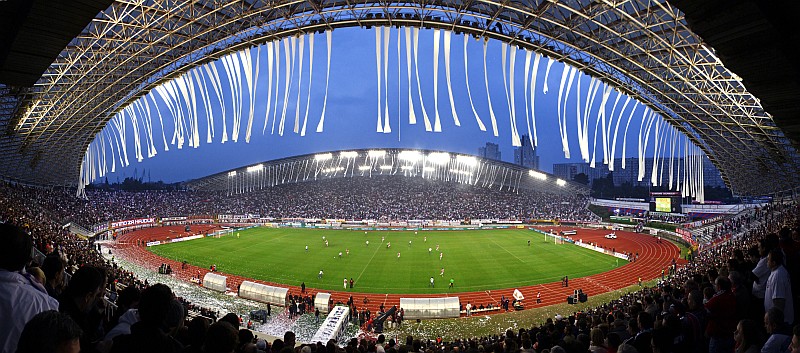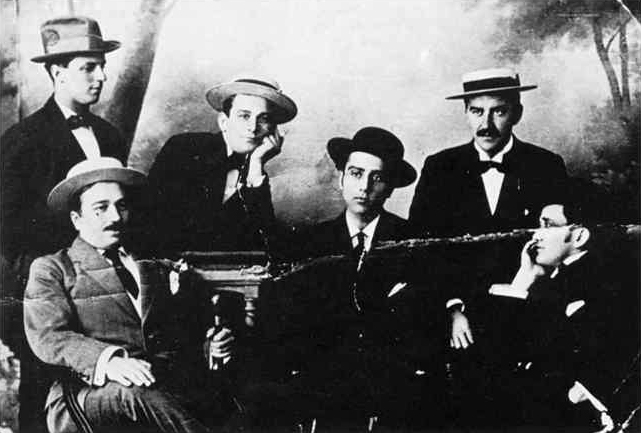|
FK Plavi Dunav
FC Plavi Dunav ( Hungarian: ''Kék Duna LE'', Serbian: ФК Плави Дунав, ''FK Plavi Dunav'', English: ''FC Blue Danube'') was a football club from Skorenovac, Vojvodina, Serbia. The club was founded in 1932. Name history *SCS (Sports Club Skorenovac) – ''( Székelykevei Sport Club )'' (1932–1949) *FK Plavi Dunav ''( Kek Duna LE )'' (from 1949 to the present) Club history Plavi Dunav was founded on June 14, 1932 under the name ''Székelykevei Sport Club''. It was founded by former Skorenovac high school students led by Thomas and József Jung, János Hubert and Borsós József. A key achievement to this group's success was that they were able to obtain land for a soccer field, from an area which remained part of the school's property. The judge of the village, Janoš Selić, helped them obtain this land. After that they played their first friendly matches against teams from Ivanovo, Pločica, Mramorak and Banatski Brestovac. President of the club was Milivoj ... [...More Info...] [...Related Items...] OR: [Wikipedia] [Google] [Baidu] |
Skorenovac
Skorenovac ( Serbian: Скореновац; Hungarian: ''Székelykeve''; German: ''Skorenowatz,''; Banat Bulgarian: ''Gjurgevo'') is a village located in the Kovin municipality, in the South Banat District of Serbia, in the Autonomous Province of Vojvodina. The village has a Hungarian ethnic majority (86.71%) and a population of 2,574 (2002 census). Geography The closest towns are Kovin (6 km), Smederevo (17 km), Pančevo (30 km), and Belgrade (46 km). History General history The village named Gyurgyova-Rádayfalva (Đurđevo) existed between 1869 and 1886 at the location between Banatski Brestovac and Danube river. In 1869, the population of Gyurgyova numbered 396 people, later, 1880 census, the population number drop to 298 people. After initial settlement, which included Hungarian (Palóc) families from Banatsko Novo Selo (''hun'': Újfalu), Jermenovci (''hun'': Ürményháza), Sándorfalva, Szeged county and Banatski Dušanovac (''hun'': Szőlősud ... [...More Info...] [...Related Items...] OR: [Wikipedia] [Google] [Baidu] |
Yugoslavia
Yugoslavia (; sh-Latn-Cyrl, separator=" / ", Jugoslavija, Југославија ; sl, Jugoslavija ; mk, Југославија ;; rup, Iugoslavia; hu, Jugoszlávia; rue, label=Pannonian Rusyn, Югославия, translit=Juhoslavija; sk, Juhoslávia; ro, Iugoslavia; cs, Jugoslávie; it, Iugoslavia; tr, Yugoslavya; bg, Югославия, Yugoslaviya ) was a country in Southeast Europe and Central Europe for most of the 20th century. It came into existence after World War I in 1918 under the name of the ''Kingdom of Serbs, Croats and Slovenes'' by the merger of the provisional State of Slovenes, Croats and Serbs (which was formed from territories of the former Austria-Hungary) with the Kingdom of Serbia, and constituted the first union of the South Slavic people as a sovereign state, following centuries in which the region had been part of the Ottoman Empire and Austria-Hungary. Peter I of Serbia was its first sovereign. The kingdom gained international recog ... [...More Info...] [...Related Items...] OR: [Wikipedia] [Google] [Baidu] |
Hungary
Hungary ( hu, Magyarország ) is a landlocked country in Central Europe. Spanning of the Carpathian Basin, it is bordered by Slovakia to the north, Ukraine to the northeast, Romania to the east and southeast, Serbia to the south, Croatia and Slovenia to the southwest, and Austria to the west. Hungary has a population of nearly 9 million, mostly ethnic Hungarians and a significant Romani minority. Hungarian, the official language, is the world's most widely spoken Uralic language and among the few non-Indo-European languages widely spoken in Europe. Budapest is the country's capital and largest city; other major urban areas include Debrecen, Szeged, Miskolc, Pécs, and Győr. The territory of present-day Hungary has for centuries been a crossroads for various peoples, including Celts, Romans, Germanic tribes, Huns, West Slavs and the Avars. The foundation of the Hungarian state was established in the late 9th century AD with the conquest of the Carpathian Basin by Hungar ... [...More Info...] [...Related Items...] OR: [Wikipedia] [Google] [Baidu] |
Tiszaalpár
Tiszaalpár is a village in Bács-Kiskun county, in the Southern Great Plain region of southern Hungary. Geography It covers an area of and has a population Population typically refers to the number of people in a single area, whether it be a city or town, region, country, continent, or the world. Governments typically quantify the size of the resident population within their jurisdiction using a ... of 4897 people (2015). References External links * in Hungarian Populated places in Bács-Kiskun County {{Bacs-geo-stub ... [...More Info...] [...Related Items...] OR: [Wikipedia] [Google] [Baidu] |
Pančevo
Pančevo (Serbian Cyrillic: Панчево, ; german: Pantschowa; hu, Pancsova; ro, Panciova; sk, Pánčevo) is a city and the administrative center of the South Banat District in the autonomous province of Vojvodina, Serbia. It is located on the shores of rivers Tamiš and Danube, in the southern part of Banat region. Since the 2011 census 123,414 people have been living in the Pančevo administrative area. Pančevo is the fourth largest city in Vojvodina and the ninth largest in Serbia by population. Pančevo was first mentioned in 1153 and was described as an important mercantile place. It gained the status of a city in 1873 following the disestablishment of the Military Frontier in that region. For most of its period, it was the part of the Kingdom of Hungary and after 1920 it became part of the Kingdom of Serbs, Croats and Slovenes, which was renamed in 1929 to Yugoslavia. Since then with one interruption it was part of several Yugoslav states and after the dissolution ... [...More Info...] [...Related Items...] OR: [Wikipedia] [Google] [Baidu] |
FK Dinamo Pančevo
FK Dinamo Pančevo () was a defunct football club based in Pančevo, Vojvodina, Serbia. The club, founded in 1945, should not be confused with Dinamo 1945, founded in 2014. History Founded in 1945, the club made its competitive debut in the 1946–47 Serbian League, placing second in Group North behind Sloga Novi Sad. They subsequently lost to Torpedo Sarajevo in the playoffs for the Yugoslav First League, but instead qualified to the newly formed Yugoslav Second League. The club spent two seasons in the second tier before being relegated to the newly formed Yugoslav Third League in 1950. Between 1968 and 1974, the club competed in the Yugoslav Second League, including five seasons in Group North and one in Group West, before suffering relegation to the Vojvodina League. They spent two seasons in the third tier before being relegated to the fourth tier of Yugoslav football in 1976. The club promptly returned to the third tier in 1977. They won the Vojvodina League in 1985–86 ... [...More Info...] [...Related Items...] OR: [Wikipedia] [Google] [Baidu] |
Gradski Stadion U Poljudu
Gradski stadion u Poljudu ( en, City Stadium in Poljud), better known as Stadion Poljud ( en, Poljud Stadium) or simply Poljud, is a multi-use stadium in Split, Croatia, which has been the home ground of Hajduk Split football club since 1979. The stadium is located in the neighbourhood of Poljud, which belongs to city district of Spinut. It was opened in September 1979, and has a seating capacity of 33.987 The venue was built to host the 1979 Mediterranean Games and was opened by then Yugoslav president Josip Broz Tito. It had an original capacity of 55,000, increased to 62,000 in the 1980s, before being equipped with seats in the 1990s thus reducing the capacity to 33.987 Poljud Stadium was also the venue for the 1990 European Athletics Championships and 2010 IAAF Continental Cup, while from 2013 to 2018, it hosted Ultra Europe annually. Design Its trademark is a seashell-like design by Croatian architect Boris Magaš with a roof structure spanning at 206×47 meters. Its des ... [...More Info...] [...Related Items...] OR: [Wikipedia] [Google] [Baidu] |
HNK Hajduk Split
Hrvatski nogometni klub Hajduk Split, commonly referred to as Hajduk Split () or simply Hajduk, is a Croatian professional football club based in Split, that competes in the Croatian First League, the top tier in Croatian football. Since 1979, the club's home ground has been the 34,198-seater Stadion Poljud. The team's traditional home colours are white shirts with blue shorts and blue socks. The idea to form a football club was started by group of Split students who were studying in Prague. After observing a game between Slavia and Sparta Prague, the group gathered at the U Fleků tavern and talked of creating a football club at home. When they returned to Split, they put their plan in motion and Hajduk was founded on 13 February 1911. Between the early 1920s and 1940, Hajduk regularly participated in the Kingdom of Yugoslavia national championship. Following World War II and the formation of the Yugoslav league system in 1946, Hajduk went on to spend the entire SFR Yugoslavia ... [...More Info...] [...Related Items...] OR: [Wikipedia] [Google] [Baidu] |
Stadion Crvena Zvezda
The Rajko Mitić Stadium ( sr, / , ), previously known as Red Star Stadium ( sr, / ), also known as Marakana ( sr-Cyrl, Маракана), is a multi-use stadium in Belgrade, Serbia which has been the home ground of Red Star Belgrade since 1963. The stadium is located in Dedinje, municipality of Savski Venac. Rajko Mitić Stadium, renamed in December 2014 in honor of club's former player and legend Rajko Mitić (1922–2008), has a seating capacity of 53,000 and is currently the largest stadium in Serbia by capacity. The Stadium has hosted numerous international matches at a senior level, including European Cup final in 1973 and UEFA European Championship finals in 1976. History The first football stadium in this location was opened on 24 April 1927. It was the stadium of SK Jugoslavija, Yugoslav football champion in 1924 and 1925. It consisted of a 30,000 capacity stadium with grass pitch, athletic track, training facility and club house. SK Jugoslavija played its match ... [...More Info...] [...Related Items...] OR: [Wikipedia] [Google] [Baidu] |
Red Star Belgrade
Fudbalski klub Crvena zvezda ( sr-Cyrl, Фудбалски клуб Црвена звезда, lit=Red Star Football Club, ), commonly known as Red Star Belgrade in English-language media, is a Serbian professional football club based in Belgrade, and a major part of the Red Star multi-sport club. They are the most successful club from the Balkans and Southeast Europe, being the only club to win both the European Cup and Intercontinental Cup, having done so in 1991, and only the second team from Eastern Europe to win the European Cup. With 33 national championships, 26 national cups, 2 national supercups, 2 national champions leagues and one league cup between Serbian and Yugoslav competitions, Red Star was the most successful club in Yugoslavia and finished first in the Yugoslav First League all-time table, and is the most successful club in Serbia. Since the 1991–92 season, Red Star's best results were reaching the UEFA Champions League group stage, the UEFA Europa L ... [...More Info...] [...Related Items...] OR: [Wikipedia] [Google] [Baidu] |
Yugoslavia National Football Team
The Yugoslavia national football team; hr, Jugoslavenska nogometna reprezentacija; sl, Jugoslovanska nogometna reprezentanca; mk, Фудбалска репрезентација на Југославија, Fudbalska reprezentacija na Jugoslavija represented Yugoslavia in international association football. Although the team mainly represented the pre-war Kingdom of Yugoslavia and the post-war SFR Yugoslavia, various iterations of the state were formally constituted in football, including the: * Kingdom of Serbs, Croats and Slovenes (1918–1929) * Kingdom of Yugoslavia (1929–1945) * Democratic Federal Yugoslavia (1945) * Federal People's Republic of Yugoslavia (1945–1963) * Socialist Federal Republic of Yugoslavia (1963–1992) It enjoyed success in international competition, finishing in fourth place at the 1930 and 1962 FIFA World Cups. In 1992, during the Yugoslav wars, the team was suspended from international competition as part of the United Nations sanctions o ... [...More Info...] [...Related Items...] OR: [Wikipedia] [Google] [Baidu] |





.jpg)
